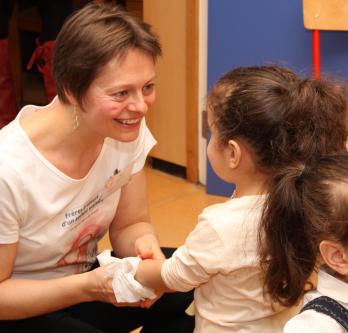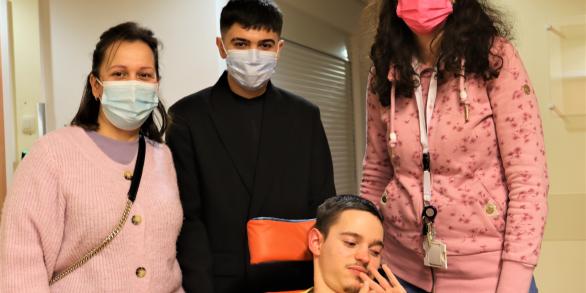We're hiring ! Join us and make a difference in our hospitals
Psychology baby-child-teen
Contact
Our role
From early childhood to adolescence, clinical psychologists offer the child and family a space for dialogue and evaluation to accompany the particularities and resources of each individual. They act in the event of illness, trauma, handicap, complaint, pain, relational difficulties at home or at school, learning difficulties, anxiety and/or depression, etc. for each child in accordance with his or her needs.

"The well-being and development of the child are placed at the centre of our concerns while taking into account the context. Each child is unique and must be considered in his or her singularity."
Our specialities
Clinical psychologists in a hospital environment work in close contact with the care staff at the hospital, the Robert Dubois school (the hospital school) and SOS children, also in partnership with all the administrative teams. Putting into place interdisciplinary teams organised by the specialist doctor permits the participation of a specialised psychologist at the clinic.
We have many psychologists who work in paediatrics, either to intervene in emergencies in the case of crisis situations as in intensive care or neonatology, or in the context of serious or chronic diseases (food aversions, cardiology, diabetology, dialysis, pain, endocrinology, genetics, haemato-oncology, paediatric liaison, metabolic disorders, cystic fibrosis, neuropaediatrics, palliative care, urology-nephrology).
Within child psychiatry, psychologists work with outpatients (child psychiatry consultations, Autism Resource Centre, transition) or with hospitalised patients (child psychiatry unit for ages 8-14, crisis unit, child psychiatry liaison, therapeutic kindergarten, APPI unit – early individualised care for autistic spectrum disorders and Parents-Babies unit).
The psychologist is also present in Surgery at the time of hospitalisation and also at the Junior Weight Clinic.
How to contact a psychologist as patient, parent or professional working closely with the child?
During hospitalisation
Psychological care is an inherent part of the care provided in many disciplines and care sectors at the hospital. A psychologist can therefore meet with you and your child spontaneously during hospitalisation or at a consultation. In other departments, the psychologist visits following request by a member of the care staff, a patient or a family member only. Please feel free to discuss this with members of the care team if you feel the need.
At a consultation
Depending on the problem encountered, it is also possible to request an appointment for a consultation. This request can be made by the young person, parents, GP, child psychiatrist or any other specialist or healthcare professional; also through schools, PMS [health control plan] , Mental Health Centres, etc. To request a consultation as an outpatient, see the section 'consultation'.

Research
In combining our experience in the field and the interest of our teams in research, we have developed expertise in many fields, including doctorate theses on autism (S. Carlier, L. Chiodo), sleeping problems among young children (F. De Gheest), depressive disorders (S. Deplus), the psychological development of the chronically ill child (I. Lambotte) and family dynamics in relation to parental separations (C. Van Pevenage).
Teaching
In cooperation with the ULB we support and coordinate many internships on the path to qualifying as psychology assistant, psychologist or psychotherapist for children and juveniles and also participate in the training of doctors, nurses, physiotherapists and specialist physiotherapists. The sharing and transmission of know-how are inherent to the functions of the hospital psychologist, hence the conferences we organise intra and extra-muros on the occasion of national and international congresses.
Do you want to do your internship at the Psychology Department – children and juveniles sector ?
Focus
Genuine intra- and extra-hospital networking ensures continuity of care. We undertake specific work on the transition to adult medicine for adolescents. Close cooperation has also developed between the care teams, the ULB and our partner universities to participate in the continuous improvement of healthcare for children. The department is represented on the Ethics Committee.
Publications
La famille face à l'enfant gravement malade: Le point de vue du psychologue.
- Authors : Van Pevenage, C., & Lambotte, I.
- Journal : Enfances, Familles, Generations,(24), 2016.
Aspects psychologiques de la drépanocytose en pédiatrie
- Authors : Frippiat, J., Ferster, A., Delvenne, V., Ngalula, M., Devalck, C., Lambotte, I.
- Journal : Neuropsychiatrie de l’enfance et de l’adolescence, 69, 7, 387-393 (2021).
Plus-value de l'implication des enseignants dans le dépistage des troubles du spectre autistique. Divergences et convergences d'informations avec les parents et les professionnels sur base de l'Autism Discriminative Tool (ADT)
- Authors : Carlier, S., Ducenne, L., Colinet, H., Poncin, F. & Delvenne
- Journal : Neuropsychiatrie de l'Enfance et de l'Adolescence, 69(5), 211-220 (2021)
Penser les frères et sœurs de l’enfant malade ou handicapé à l’hôpital
- Authors : Vankerckhove S., Dewinter P., Hendrijckx G., Dubuisson C., Deterville C., Lambotte I.
- Journal : Cahiers critiques de thérapie familiale et de pratiques de réseaux, 68, 1, 143-158. (2022)
Our team
